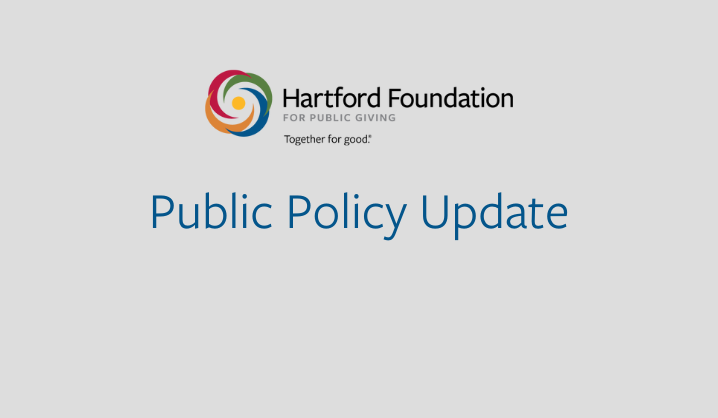New & Noteworthy

Hartford Foundation Testifies with Community Foundations in Fairfield/New Haven in Support of Legislation Creating a Benefits Cliff Pilot Program
Read the Foundation's Testimony
On Tuesday, March 5, the Hartford Foundation for Public Giving, in collaboration with its peers, Fairfield County's Community Foundation and The Community Foundation for Greter New Haven, submitted testimony to the legislature’s Human Services Committee in support of House Bill 5369, An Act Concerning a Benefits Cliff Pilot Program.
Over the past several years, the Connecticut Urban Opportunity Collaborative (CUOC) (a collaboration between Fairfield County’s Community Foundation, the Hartford Foundation for Public Giving and The Community Foundation for Greater New Haven) has been working to develop inclusive growth policies and strategies that support the residents in our urban communities. Our community foundations also invest in rural and suburban communities. We have learned that maintaining strong social services safety nets are vital across geography ensure that working families have access to the services and supports that promote job readiness and stability and equitable economic mobility. Some our organizations’ staff have served on the Two Generation Interagency Workgroup, and we applaud the work of the 2Gen Benefits Cliffs Working Group to examine benefits cliffs that serve as disincentives for families who want to increase their earnings potential.
Our organizations support House Bill 5369’s effort to direct the Commissioners of Social Services, Housing and Early Childhood to establish a benefits cliff mitigation pilot program to support the economic self-sufficiency of certain assistance program beneficiaries. The current legislation calls for a 12-month pilot. We recommend extending the pilot to 24 months with annual reports provided to the legislature to track progress.
The bill offers commissioners the option to gradually reduce—instead of automatically eliminating—assistance program benefits when income from employment exceeds income eligibility thresholds. We believe the pilot would be more effective in promoting income stability to allow additional time for program participants to maintain their existing benefit levels for a 24-month period. If this change were implemented, the step-down process could begin at 12 months. Extending the time for the pilot would also ensure more robust data collection and time to consider recommendations for next steps.
This legislation represents an important first step. Currently, the final report is limited to the number of participants and impact on economic self-sufficiency. We would also urge the committee to include qualitative data to capture participant perspectives on the difference maintaining access to benefits makes and how it has created stability and allowed them to take advantage of new opportunities. The real story of impact will be in how it has changed people’s lives, something that cannot be reflected in numbers alone. We recommend the final report include recommendations that provide a path forward to continue advancing self-sufficiency and economic mobility for families.
We are aware that DSS, DOH and OEC, as members of the Interagency Council to End Homelessness, are currently working on how issues such as access to benefits impact homelessness. These activities do align with the intentions of the study. Our organizations recommend that there is adequate funding to ensure that the agencies have the resources needed to implement the pilot, data collection and reporting, including for staffing.
Income inequality remains a significant issue in our state. According to DataHaven’s Equity Profiles, in Connecticut, 21 percent Latino households and 17 percent of Black households live below the poverty line compared to six percent of white households. The profiles also highlight income inequality by residents’ participation in the Supplemental Nutritional Assistance Program (SNAP), available to very low-income households (earning less than 130 percent of the federal poverty guideline, or $26,500 for a family of four in 2021). In Connecticut, 30 percent of Latino households and 24 percent of Black households were enrolled in SNAP compared to six percent of white households.
To reduce barriers that many students and participants in workforce development programs often encounter, our organizations have long supported providing funding to cover a wide range of wraparound supports, often addressing access to childcare, food, clothing, housing stability, transportation, and other basic needs. We have seen how providing these supports is vital to people’s successful participation in educational and workforce development programs and in the workforce. We expect families participating in the pilot program will continue to need their existing benefits to successfully transition to economic self-sufficiency. We also anticipate this would serve as an incentive to participate in the program.
We appreciate the legislation’s call for collaboration across the three state agencies to develop this pilot. We are pleased to share what we are learning through our own investments about the need for services and supports to ensure that people can participate in the workforce while providing what they need to support themselves and their families.
